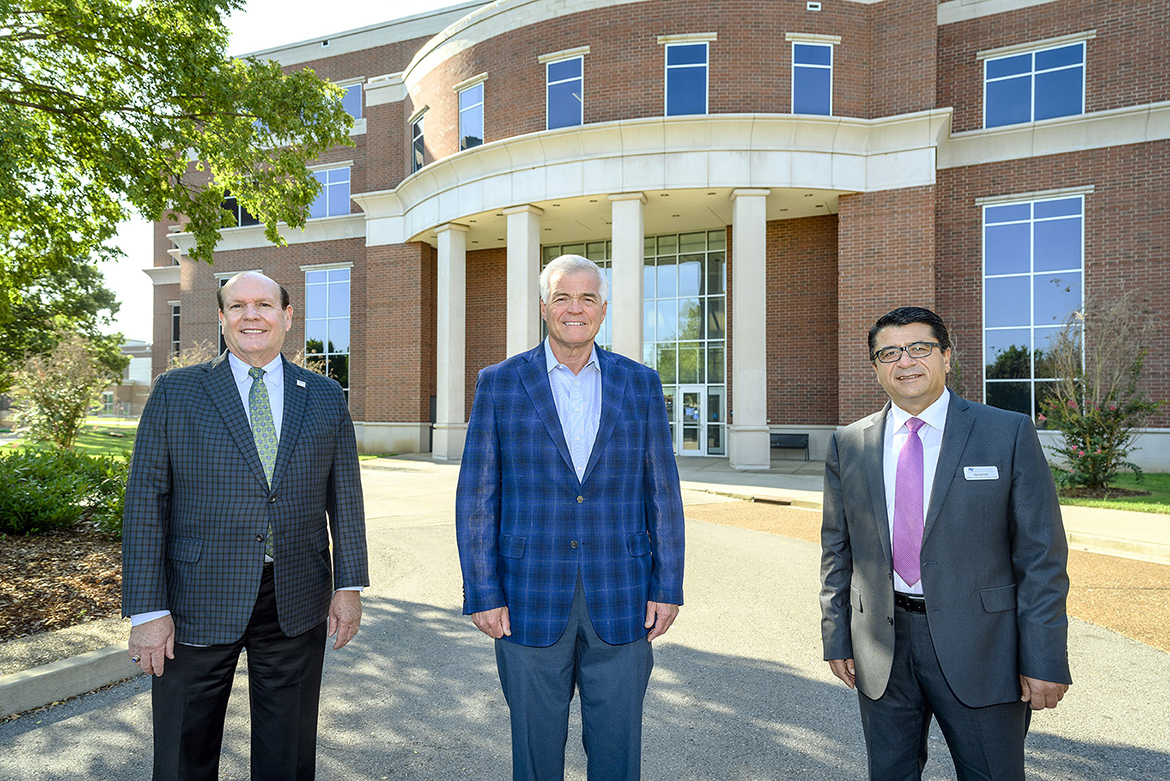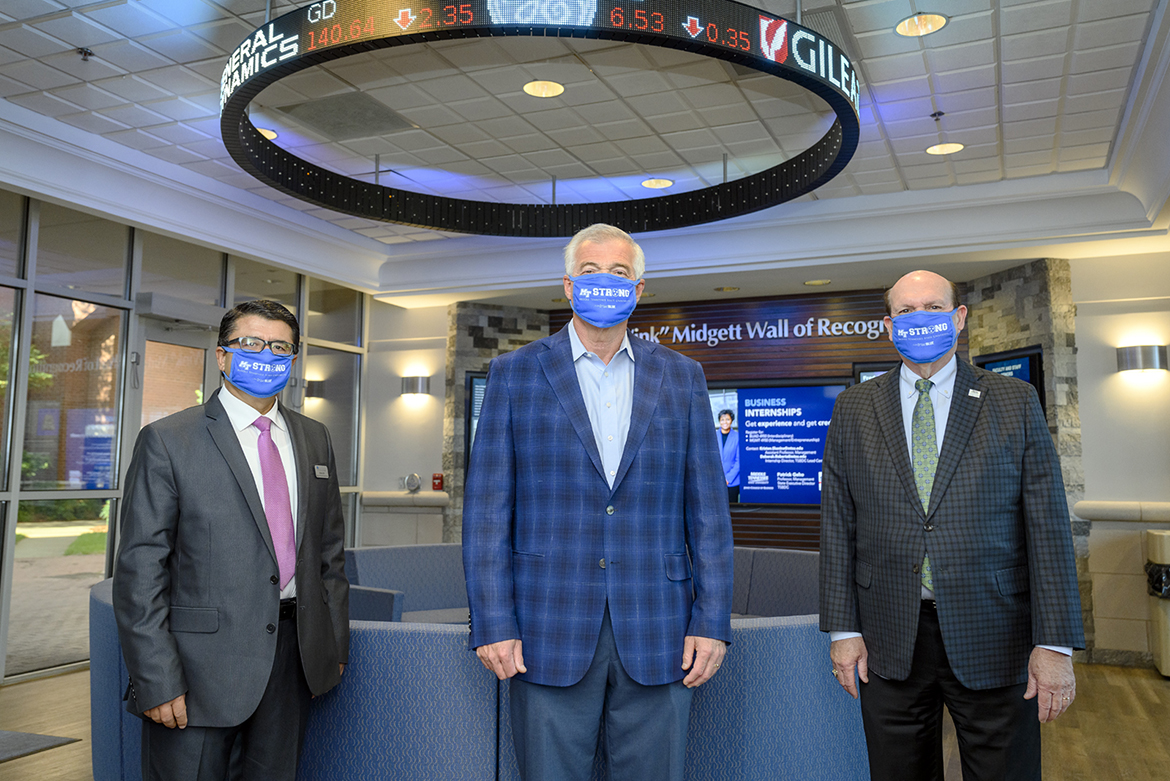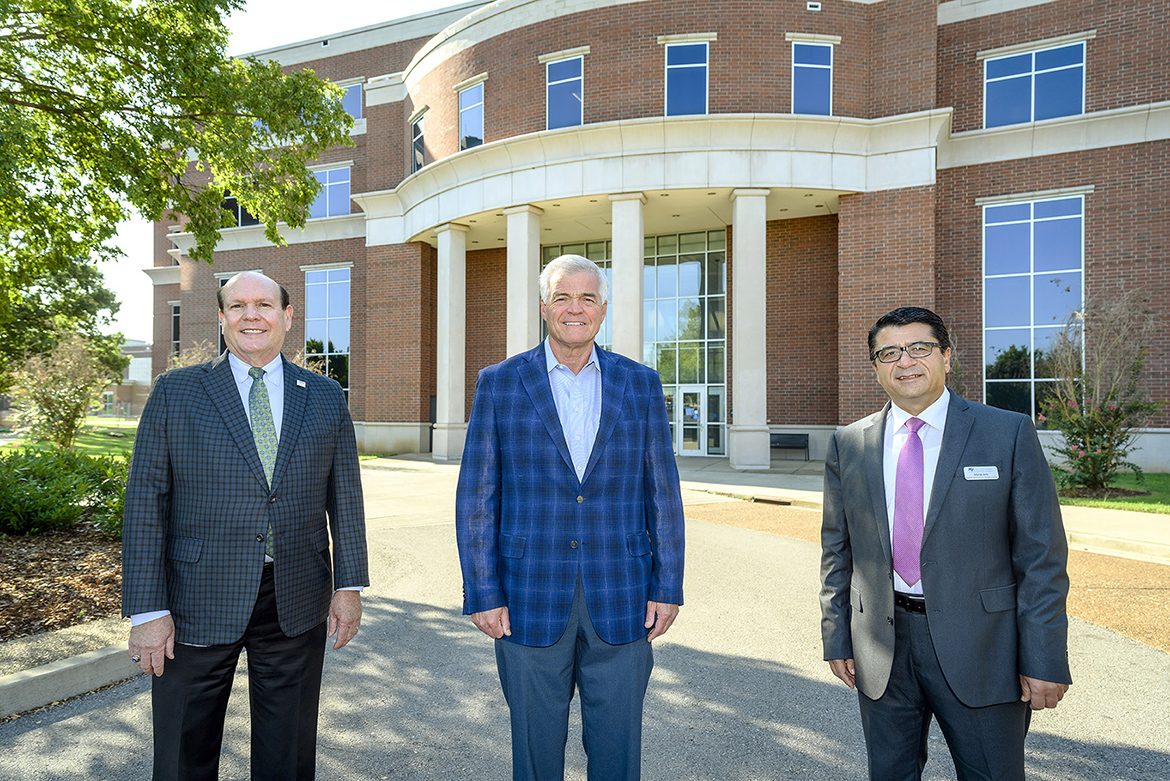The Business and Economic Research Center at Middle Tennessee State University is partnering with the U.S. Department of Agriculture to help improve access to financial relief for distressed communities in East Tennessee.
In an effort to bridge the gap between community needs and federal funding, the BERC will develop technical assistance and training programs for grant and funding application processes.

From left, Dr. David Urban, dean of the Jones College of Business at MTSU; Jim Tracy, Tennessee state director of USDA Rural Development; and Dr. Murat Arik, director of the Business and Economic Research Center at MTSU, meet on Sept. 21, 2020, outside the Business and Aerospace Building to discuss a new project partnership between the USDA and the BERC to help distressed communities. (MTSU photo by J. Intintoli)
Murat Arik, director of the BERC at MTSU’s Jones College of Business, stated this three-year project comes at a time when there is a high demand for relief programs.
“BERC is pleased to work with the USDA to help rural communities access much needed federal funds for rural projects. We look forward to further engagement through the USDA in communities across Tennessee,” said Arik, the principal investigator of the project.
The joint venture will eliminate barriers that exist in communities with limited population and income.
“Some applicants may lack the expertise or resources necessary to complete funding requests for infrastructure projects, hence the need for outside assistance the BERC will provide,” Arik said.
The BERC/USDA project is intended to serve distressed communities with a population size of less than 10,000 and median household income less than 75 percent of the state’s non-metro median household income. The grant will target two USDA service regions: USDA Knoxville Office and USDA Greeneville Office in Tennessee.
Within these two USDA service regions, BERC identified 16 communities across 11 counties for the initial target areas. However, all areas in the region falling under the population and income criteria will be eligible to use the proposed services under this grant.
To increase community access to funding sources, such as the USDA’s Community Facilities Program, the BERC will implement several solutions, including the creation of simplified financial information materials, the development of a digital data-gathering platform for financial information, and regional workshops. The workshops developed by BERC associates will be designed to facilitate grant applications to address the management of financial information and other practical tools.
Additionally, the BERC will train a technical assistant to work with distressed communities in their grant application preparation. This technical assistant will be a liaison among the USDA, BERC staff, and the communities.

From left, Dr. Murat Arik, director of the Business and Economic Research Center at MTSU; Jim Tracy, Tennessee state director of USDA Rural Development; and Dr. David Urban, dean of the Jones College of Business at MTSU, meet on Sept. 21, 2020, inside the Business and Aerospace Building to discuss a new project partnership between the USDA and the BERC to help distressed communities. (MTSU photo by J. Intintoli)
David Urban, dean of the Jones College of Business at MTSU, said the faculty and staff involved in the project have the expertise to succeed in helping areas in Tennessee with limited resources.
“The Jones College of Business prides itself on impactful engagement with the broader community. This latest BERC partnership gives Jones College an excellent opportunity to implement vital business solutions by utilizing the expertise of our scholars and professionals who are experts in business research, finance, and technology. We are all about economic development,” said Urban.
 The average population size of the initially targeted communities is 3,134, according to the U.S. Census Bureau’s 2018 population projects and 2010 census. Census data additionally shows the average medium household Income of the targeted area is $28,661, which is 65.47% of the state’s non-metro MHI.
The average population size of the initially targeted communities is 3,134, according to the U.S. Census Bureau’s 2018 population projects and 2010 census. Census data additionally shows the average medium household Income of the targeted area is $28,661, which is 65.47% of the state’s non-metro MHI.
“This partnership between the USDA Rural Development and Middle Tennessee State University will create access to capital in some of East Tennessee’s most vulnerable communities. This investment will provide eligible applicants with technical assistance and application assistance making rural infrastructure development attainable as well as advance progress toward rural prosperity in East Tennessee,” said Jim Tracy, the Tennessee state director of USDA Rural Development.
To evaluate the success of the 36-month-long project, the BERC will review the impact of each service provided to the local communities. This impact report will analyze how many communities were served, how many applications were filed, how many projects were awarded and their impacts on their communities, and how cost-effective and impactful were the services provided by BERC.
Since 1970, the BERC has worked with mayors, nonprofit organizations, state and local governments, chambers of commerce, economic development districts, Tennessee Small Business Development Center, universities, and private entities. BERC activities include economic and fiscal impact studies, feasibility assessments, cluster analysis, wage and benefit studies, lectures, workshops and international business dynamics.
To learn more about the BERC, visit www.mtsu.edu/berc, or to learn more about the USDA partnership, email berc@mtsu.edu.
— Brian Delaney (Brian.Delaney@mtsu.edu)


COMMENTS ARE OFF THIS POST